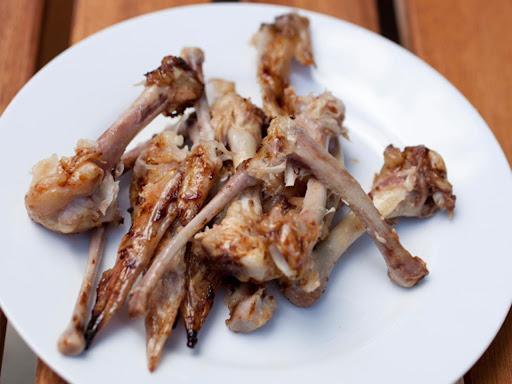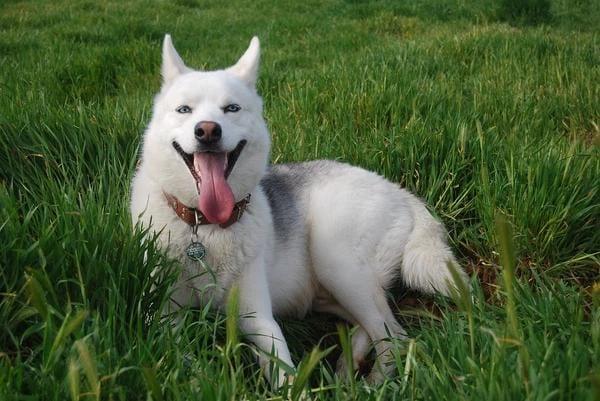Source: https://www.caferacer.net/threads/team-chicken-bone-2020.41050/
Can Dogs Really Eat Chicken Bones? | As dog owners know, dogs love to play with, chew on, and eat just about anything they get ahold of--even things that aren't safe for them. And dogs have a habit of stealing leftovers or rooting through trash cans to eat meat and other scraps. In the process, they may find raw or cooked chicken bones. But are these bones safe for dogs to consume? We'll tell you everything you need to know to determine which bones are safe to give your dog and which ones you should keep away from them.
Related: Measure Dog Food Portions: The Ultimate Guide
Can Chicken Bones Harm Dogs?
Dogs can usually digest chicken bones without any problem, as the bones dissolve once they reach a dog's stomach and can then pass through the digestive tract without doing any damage. In some cases, though, chicken bones can harm dogs in one of the following ways.
Choking Hazards
When dogs try to swallow bones whole, they can become lodged in the esophagus and cause the dog to gag or retch. Bones that get stuck at the start of a dog's airway can restrict their breathing, causing them to choke and cough heavily to dislodge the bone. As such, you should treat bones as potential choking hazards and learn what to do if your dog does choke on one.
GI Tract Tears
Chicken bones can splinter and cause tears in your dog's esophagus or intestinal tract, especially if they are cooked. These tears can then result in inflammation and infections. If this does happen, get your dog medical attention immediately.
Bacterial Infections
Raw chicken bones may contain salmonella and other dangerous bacteria, which can make your dog very sick. Watch your dog for signs of a bacterial infection, such as vomiting, cramping, fever, and diarrhea with blood or mucus. These infections require a trip to the vet for treatment. Otherwise, your dog can become dangerously ill.
Can You Feed a Dog Raw Chicken Bones?
Yes, raw chicken bones are generally safe for dogs to eat, as dogs' digestive systems can naturally process them. Raw bones are also a good source of phosphorus and calcium for dogs.
When feeding your dog raw chicken bones, serve it alongside a meaty meal. Your dog's stomach produces more acid in response to a meal and digests the bone better this way.
Chicken wing tips and neck pieces are the safest bones to feed your dog, and by cutting them into small, flat pieces, you can prevent your dog from choking on them.
Can You Feed a Dog Cooked Chicken Bones?
Raw chicken bones are safer for dogs to eat than cooked chicken bones. Because cooked bones are softer and more brittle, they splinter more than raw ones. These splinters can then injure your dog's mouth, throat, and digestive tract as they pass through. Cooked bones are also less nutritious for dogs, so raw bones are all around a safer and better option.

Source: https://www.dogingtonpost.com/help-my-dog-ate-chicken-bones-what-do-i-do/
Want to give your dog tasty treats that are also good for them? Dope Dog makes CBD dog treats that will please your dog’s tastebuds while improving their quality of life!
Related: Best CBD Treats for Dogs
What Should I Do if My Dog Eats a Chicken Bone?
Dogs tend to get into things they shouldn't. Your dog may snatch a chicken bone from a meal or dig it out of the trash while you're not looking. If that happens, you can do the following to make sure your dog is safe.
- Calmly take the bone from your dog if they're still eating it. Dogs can get possessive about food. Trying to snatch a bone away suddenly may make them eat it more quickly before you can take it from them.
- If your dog has already eaten the bone, stop them from eating more by cleaning up any food they got into or moving a trashcan containing other bones out of their reach.
- Call your vet and ask what you should do next. Your vet can tell you whether they need to see your dog and recommend steps to take at home. Most vets caution against making a dog vomit up bones as they can become lodged in the throat that way. They may instruct you to feed your dog bread or pumpkin instead, which will pass through with the bone and minimize potential intestinal damage.
- Don't try to self-treat your dog. Rely on advice given to you by your vet or another qualified professional. Information you find on the internet may be inaccurate, and even well-meant advice from friends or family can be wrong. Acting on inaccurate information can do more harm than good and may make your dog's condition worse.
- Watch your dog for signs of vomiting, gagging, retching, drooling, coughing, or impaired breathing over the next 48 hours. Some signs of distress won't occur immediately after your dog eats the bone, so keep an eye on them and take them to the vet if they display these symptoms.
How Long Does It Take Dogs to Digest Chicken Bones?
Dogs will usually pass a chicken bone within 24 hours, but this can vary based on your dog's breed, age, size, and diet. Some dogs can take more than two days to pass a bone, which is why it's important to keep an eye on your dog for at least a couple of days after they eat a bone.
What Bones Are Safe for Your Dog?
Raw bones are safer for dogs to eat than cooked ones. You can pick between two kinds of raw bones to give your dog: nutritional dog bones and recreational raw bones.
Nutritional bones are high in phosphorous and calcium and intended to supplement a dog's diet. You can even pass them through a meat grinder to make them safer for your dog to eat. Recreational bones are intended more as toys. These bones are tough and won't splinter easily, making them safer for your dog to chew on. You should still check regularly to make sure the bones remain intact and take them from your dog if they shatter.
Raw cow and lamb bones are safer for dogs than chicken, turkey, or pig bones because they won't splinter as easily. Giving your dog these hardier bones can help avoid injury or damage to its digestive system. You can also buy synthetic bones or toys filled with treats for your dog. That way, they can chew all they want without risking injury or illness brought on by bone fragments.
Related: 6 Facts Your Vet Wished Your Knew About Keeping Your Dog Healthy

Source: https://doglab.com/chew-toy/
Are you looking for safe and fun treats to give your dog? Dog Dope makes tasty CBD treats that your dog will love!


















